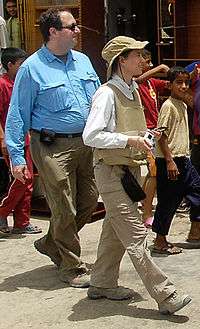Kimberly Kagan
|
Drs. Frederick and Kimberly Kagan touring Basra in 2008. | |
| Website | ISW |
|---|---|
Kimberly Ellen Kagan (born 1972) is an American military historian. She heads the Institute for the Study of War and has taught at West Point, Yale, Georgetown University, and American University. Kagan has published in The Wall Street Journal, The New York Times, The Weekly Standard and elsewhere.[1] She supported the surge in Iraq and has since advocated for an expanded and restructured American military campaign in Afghanistan.[2] In 2009 she served on Afghanistan commander Gen. Stanley McChrystal's strategic assessment team.[2]
Early life
Kimberly Kagan is the daughter of Kalman Kessler, an accountant and school teacher from New York City and his wife Frances.[3][4][5] She received her B.A. in Classical Civilization and her Ph.D. in History from Yale University. At Yale, Kagan met her husband Frederick Kagan, who is an American resident scholar at the American Enterprise Institute (AEI),[6] son of Donald Kagan, a well-known historian and brother of Robert Kagan, another well-known writer and publicist. Robert Kagan's wife is Victoria Nuland, Assistant Secretary of State for European and Eurasian Affairs.
Kagan held an “Olin Postdoctoral Fellowship in Military History” at Yale in International Security Studies from 2004-2005. She is an affiliate of Harvard’s Olin Institute for Strategic Studies, where she was a National Security Fellow from 2002-2003.[7]
Works
Dr. Kagan is the author of The Eye of Command (University of Michigan Press, 2006), The Surge: A Military History (Encounter Books, 2009), and editor of The Imperial Moment (Harvard University Press, 2010).[8] Dr. Kagan has published numerous essays including “Don’t Short-Circuit the Surge” in The Wall Street Journal, “How to Surge the Taliban” co-authored with Max Boot and Frederick W. Kagan in The New York Times, and “Why the Taliban are Winning--For Now” on the Foreign Policy Magazine website.[9][10][11]
Current position
Dr. Kagan has conducted eight battlefield circulations of Iraq since May 2007 for the MNF-I Commanding General, three of which were in Afghanistan for CENTCOM United States Central Command and ISAF International Security Assistance Force. She participated formally on the Joint Campaign Plan Assessment Team for Multi-National Force-Iraq - U.S. Mission- Iraq in October 2008, and as part of the Civilian Advisory Team for the CENTCOM strategic review in January 2009.[12] Dr. Kagan served in Kabul as a member of General Stanley McChrystal’s strategic assessment team, composed of civilian experts, during his strategic review in June and July 2009. She returned to Afghanistan in the summer of 2010 to assist General David Petraeus with key transition tasks following his assumption of command in Afghanistan. Dr. Kagan also serves on the Academic Advisory Board at the Afghanistan- Pakistan Center of Excellence at CENTCOM.
Dr. Kagan is the founder and President of the Institute for the Study of War. ISW describes itself as a “non-partisan non-profit think thank which seeks to provide research and analysis specifically regarding issues of defense and foreign affairs. ISW produces comprehensive reports on the realities of war; focusing on military operations, enemy threats, and political trends in diverse conflict zones”.[13]
As an influential member of the foreign policy brain trust in Washington, D.C., Dr. Kagan has been involved numerous public events. On May 25, 2010 Dr Kagan participated in a briefing on Capitol Hill focusing on Iraq’s political crisis that included remarks from Iraq’s Ambassador Samir Sumaidaie and Dr. Kenneth Pollack, Senior Fellow at the Brookings Institution.[14] Dr Kagan also participated in a Brookings Institution event entitled “Prospects for Afghanistan's Future: Assessing the Outcome of the Afghan Presidential Election” alongside Dr. Michael O’Hanlon.[15] Dr. Kagan also helped produce the documentary The Surge: the Untold Story with ISW Chairman, U.S Army General Jack Keane (ret.) and LTG James Dubik (ret.) describing the battle of Iraq and how the United States won the war.[16]
References
- ↑ http://www.understandingwar.org/user/kkagan
- 1 2 http://www.foreignpolicy.com/articles/2009/08/10/why_the_taliban_are_winning_for_now?page=0,2
- ↑ Bender, Ryan (2009-10-11). "Husband and Wife take center stage in debate on Afghanistan". Boston Globe. Retrieved 2007-01-19.
- ↑ Margolick, David (2010-01-22). "David Margolick: Resurgence of Neoconservatism". Newsweek. Retrieved 2016-03-27.
- ↑ "Paid Notice: Deaths KESSLER, FRANCES E. (STEIN)". New York Times. 1997-11-04. Retrieved 2016-03-27.
- ↑ "Scholars and Fellows". American Enterprise Institute. November 2010. Retrieved 2010-11-12.
- ↑ "Fellows and Alumni". Harvard University. November 2010. Retrieved 2010-11-14.
- ↑ Anderson, Gary (2009-08-23). "Wrapping up operations in Iraq". Washington Times. Retrieved 2010-09-19.
- ↑ Kagan, Kimberly (2008-01-26). "Don't Short-Circuit the Surge". WSJ. Retrieved 2010-10-19.
- ↑ Kagan, Kimberly (2009-03-13). "How to Surge the Taliban". New York Times. Retrieved 2010-10-19.
- ↑ Kagan, Kimberly (2009-08-10). "Why the Taliban are Winning--For Now". Foreign Policy. Retrieved 2010-11-07.
- ↑ "Staff Bios". Institute for the Study of War. November 2010. Retrieved 2010-11-12.
- ↑ "About Us". Institute for the Study of War. December 2010. Retrieved 2010-10-12.
- ↑ "Iraq's Political Crisis with Kimberly Kagan and Samir Sumaidaie". Institute for the Study of War. May 25, 2010. Retrieved 2010-11-12.
- ↑ "Prospects for Afghanistan's Future: Assessing the Outcome of the Afghan Presidential Election". Brookings Institution. August 25, 2009. Retrieved 2010-11-11.
- ↑ ""The Surge: the Untold Story" (never-before-seen interviews)". Institute for the Study of War. November 9, 2010. Retrieved 2010-10-12.
External links
- Institute for the Study of War
- The Future of Iraq: A Conversation with General Raymond T. Odierno
- CENTCOM in 2010: Views from General David H. Petraeus
- Appearances on C-SPAN
